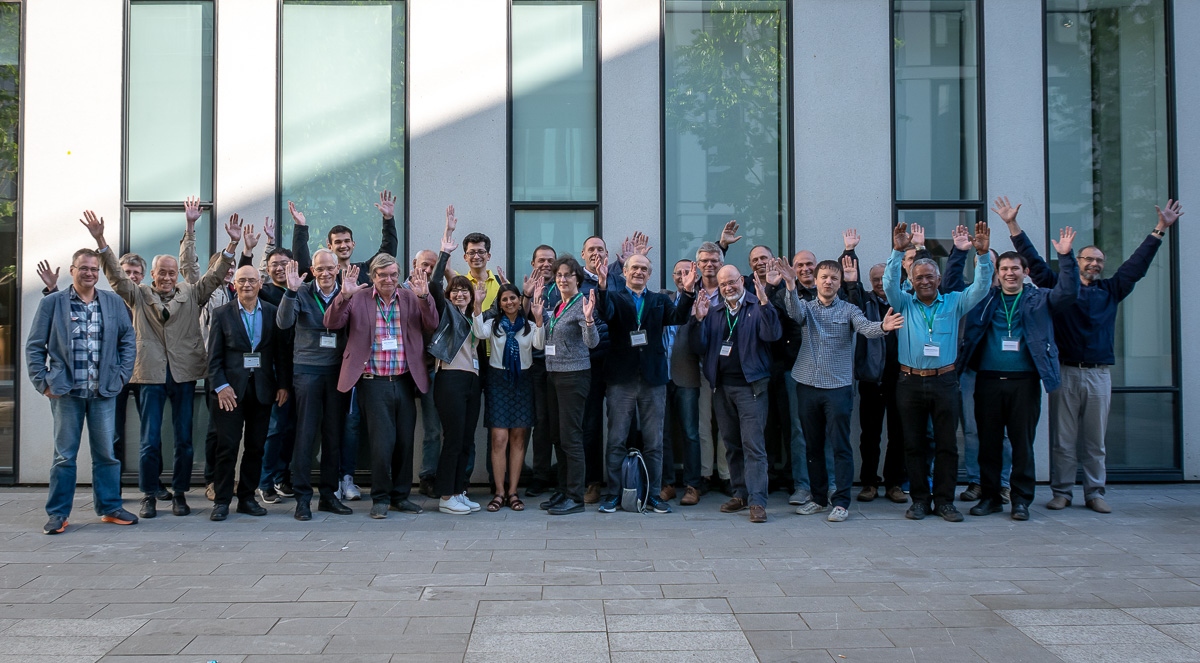Modern Applied Probability: a workshop in celebration of Sergey Foss’s 65th birthday, was held May 15–17, 2019, at the International Center for Mathematical Sciences, at The Bayes Centre in Edinburgh, UK. Takis Konstantopoulos reports:
This workshop was organized by two former students (Denis Denisov, University of Manchester, and Seva Shneer, Heriot-Watt University) and a colleague (Burak Buke, University of Edinburgh) of Sergey Foss. Held over three days, it was full of interesting lectures, discussions and a collection of reminiscences from the past. It gave everyone an opportunity to discuss the achievements of Sergey in the area of applied probability and related fields, as well as exchange ideas and form new collaborations. Talks were given by Venkat Anantharam, Søren Asmussen, François Baccelli, Onno Boxma, Mikhail Chebunin, Denis Denisov, István Gyöngy, Jennie Hansen, Takis Konstantopoulos, Dima Korshunov, Artem Kovalevskii, Günther Last, Nelly Litvak, Masakiyo Miyazawa, Ilya Molchanov, Thomas Mountford, Zbigniew Palmowski, Kavita Ramanan, Tomasz Rolski, Sasha Stolyar, Vitali Wachtel, Sergei Zuyev, and Bert Zwart (CWI). The workshop was also attended by a number of researchers and graduate students.
As usual, ICMS provided excellent facilities for the meeting. Situated in the top floor of the Bayes Centre and with a magnificent view of Arthur’s Seat [pictured below], it inspired the participants to further exchange thoughts, ideas, and even jokes, during the frequent coffee breaks.
 Arthur’s Seat, viewed from the Bayes Centre
Arthur’s Seat, viewed from the Bayes Centre
Sergey’s career started at Novosibirsk State University, where he finished his PhD in 1982 under the supervision of Boris Rogozin. The Novosibirsk school is known for the numerous contributions in theoretical and applied probability, including random walks, large deviations, asymptotic and limit theorems, and a variety of applications including queueing theory and communication systems. The Sobolev Institute of Mathematical Sciences, like the whole of Akademgorodok (a campus in the middle of Siberia, in the vicinity of its capital, Novosibirsk), was a very productive place for mathematicians from 1957 onwards, when it was established by Mikhail Lavrentyev and Sergey Khristianovich. Akademgorodok provided, during Soviet times, an almost idyllic place for scientists to do their work without the hustle and bustle of a big city or a for-profit organization. Hard times followed after the collapse of Soviet Union but, nowadays, there is a very positive trend in the university and, in particular, the Sobolev Institute. Sergey works hard to promote this trend. While he is a professor at Heriot-Watt University in Edinburgh, he also holds a position in Novosibirsk and shares his time between the two.
In the late 1980s, Sergey established a firm relationship with French applied probabilists and computer scientists and spent considerable amount of time in INRIA, first in Sophia–Antipolis and later in Paris. He worked closely with François Baccelli, establishing, inter alia, conditions for stability of general stochastic queueing networks driven by stationary and ergodic inputs.
His contributions are numerous in the area of probability and its applications. To mention just a few: recurrence criteria for oscillating random walks, ergodicity conditions for multi-class and multi-server queues and queueing networks, renovation theory for stochastic recursive sequences (initially developed by Alexander Borovkov, the director of the Probability Section at Novosibirsk since 1962), coupling from the past (or perfect simulation), the saturation rule for stability of networks, state-dependent polling systems, the development of heavy tailed distribution theory (including an in-depth understanding of the “big single jump” principle), subexponentiality and local subexponentiality, stochastic ordered graphs and last passage percolation, and many others. He has co-authored a few books, including his monograph, “An Introduction to Heavy-Tailed and Subexponential Distributions” jointly with Dima Korshunov and Stan Zachary.
Sergey has been an extremely energetic person. He has organized dozens of workshops and conferences, mostly in the UK and Russia. One of his major achievements was the co-organization of the semester-long program on “Stochastic Processes in Communication Sciences” at the Newton Institute for Mathematical Sciences, Cambridge, UK, during the first half of 2010. That event attracted a huge number of probabilists, mathematicians, applied probabilists, computer scientists and engineers from around the world and formed the basis of many collaborations.
As a mathematician, Sergey always enjoys understanding the basis of many complicated arguments, until they become “trivial”. He is an intuitionist. Whenever and wherever he encounters the seed of an interesting probabilistic truth, he will tirelessly nurture it. At the same time, he has developed over the years a taste for applied research. Queueing theory (or what was known, during Soviet times, theory of mass service) played an important role throughout his career. But he has also been interested in communication networks, and, most recently, in energy systems.
The talks at ICMS event were, in a sense, a little window in Sergey’s mathematical landscape and interests. This landscape consists of valleys, tall mountains, oceans of unfathomable
depth, easy trails and impenetrable forests; in other words, it is anything but boring, and always varied. We all enjoyed talks on unimodular random graphs, on reflected processes, on scale functions for Lévy-driven systems, on self-decomposability of point processes, on networks, on heavy-tails, on greedy server particle systems, on a new version of Itô’s formula, on mean field approximations, on combinatorial probability, on applications on energy systems, on insurance control in Bayesian context, and others.
As a colleague, a collaborator and a friend of Sergey Foss, I wish him a happy birthday.
Find details of the conference program at https://www.icms.org.uk/sergey65.php

Comments on “Meeting report: Modern Applied Probability”